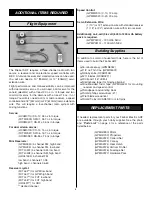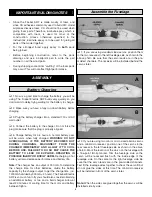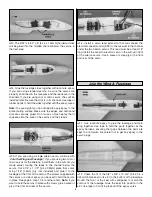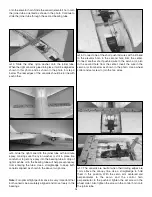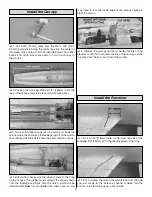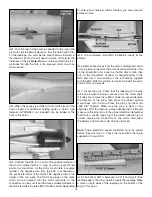
aileron, but not onto the top of the wing. Deflect the aileron
down while holding it in position against the wing. One
section at a time, press the tape onto the top of the wing.
❏
11. Return to step 7 and install the left aileron using the
same procedure.
❏
12. To complete the aileron linkage installation, insert the
Z-bend end of two short pushrod ends into the servo arm,
from below the arm. For now, insert the ends in the inner
most hole of the servo arm. Center the servo arm and
secure the servo arm to the servo with its screw. Using two
wheel collars and set screws join the short pushrod ends to
the aileron pushrods. Center the servo arm as shown and
hold each aileron centered as each set screw is tightened.
Note:
The bottom photo shows the installation of two
mini-servos.
❏
1. Glue the brass bearing tubes in place with 6-minute
epoxy. The longer bearing tube is glued to the right side of
the fuselage. The tubes should project about 1/32" [1 mm]
past the sides of the fuselage. Use the long canard joiner
tube to align the bearing tubes as the epoxy hardens. Be
very careful not to get any epoxy on the joiner tube.
Hint:
Use a little vaseline on the tube.
Note:
The bearing tubes must be glued firmly into place, as
they will be subjected to high loads in flight.
❏
2. Glue the long brass canard joiner tube into the slot in
the bottom of the left canard with 6-minute epoxy. After the
epoxy hardens, slide a nylon washer onto the brass tube
against the canard. Make sure the brass joiner tube is fully
sealed in the slot in the canard.
❏
3. Slide the long joiner tube through the short bearing
tube on the left side of the fuselage. Install the 2 x 8mm screw
Assemble the Canards
9



